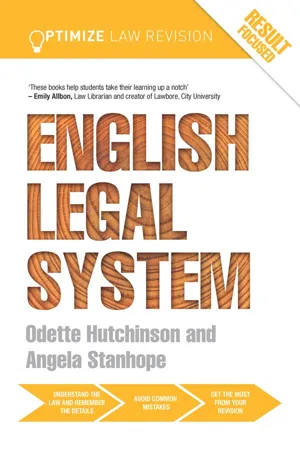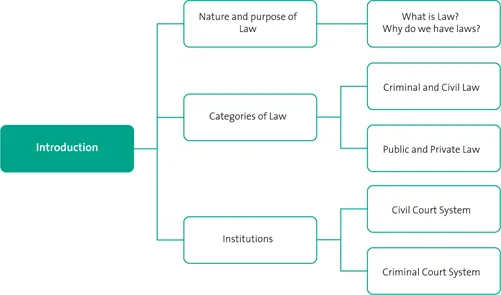
Optimize English Legal System
Angela Stanhope, Odette Hutchinson
- 296 pages
- English
- ePUB (mobile friendly)
- Available on iOS & Android
Optimize English Legal System
Angela Stanhope, Odette Hutchinson
About This Book
'[ Optimize is] ideal for undergraduate students at all levels. The content is of a high standard, easy to read and understand. The materials are very catching and easy on the eye making it easy to read and digest the materials…an essential study tool for all law students' - George Ellison, Derby
'I am really impressed…the strengths are the user friendly format, clear explanations, helpful diagrams/flowcharts and appropriate suggestions for analysing the issues concerned' - Katherine Davies, Northumbria
The Optimize series is designed to show you how to apply your knowledge in assessment. These concise revision guides cover the most commonly taught topics, and provide you with the tools to:
Understand the law and remember the details
o using diagrams and tables throughout to demonstrate how the law fits together
Contextualise your knowledge
o identifying and explaining how to apply legal principles for important cases
o providing revision advice to help you aim higher in essays and exams
Avoid common misunderstandings and errors
o identifying common pitfalls students encounter in class and in assessment
Reflect critically on the law
o identifying contentious areas that are up for debate and on which you will need to form an opinion
Apply what you have learned in assessment
o presenting learning objectives that reflect typical assessment criteria
o providing sample essay and exam questions, supported by end-of chapter feedback
The series is also supported by comprehensive online resources that allow you to test your progress during the run-up to exams.
URL: www.routledge.com/cw/optimizelawrevision/
Frequently asked questions
Information
| 1 | Introduction |
Revision objectives

Chapter Map

Introduction


